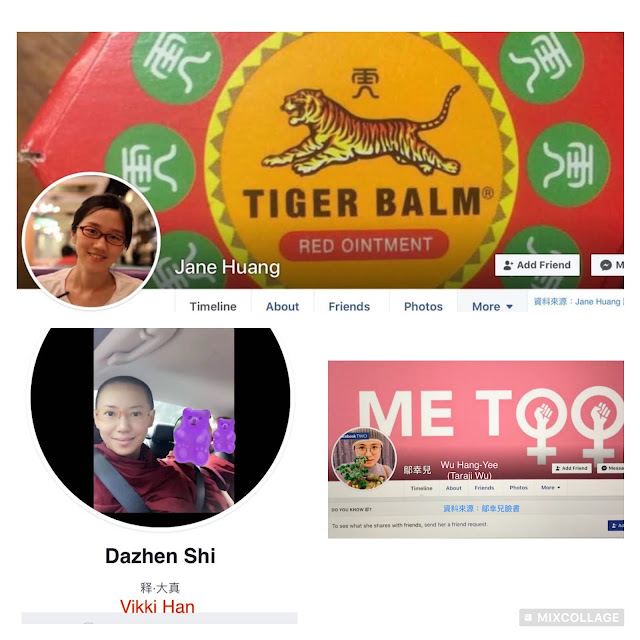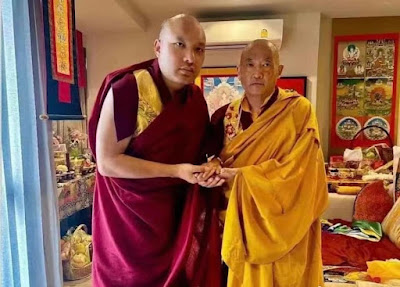【The truth of the 17th Karmapa incident】
On January 23, 2019, Taiwan’s Mirror Weekly reported that a woman named Jane Huang had accused the 17th Karmapa, Ogyen Trinley Dorje, and Dzongsar Khyentse Rinpoche. However, it was later proven that the allegations were unfounded.
The #MeToo movement began in the United States in 2017, originally intended to give a voice to victims of sexual harassment and assault. However, as the movement gained widespread attention and support, some individuals began exploiting it—fabricating accusations against men with social or economic influence as a way to gain money or status.
One such case involved a Taiwanese woman named Jane Huang (H), who told Mirror Weekly magazine that she was the Karmapa’s girlfriend and that they had engaged in sexual relations three times. Around the same time, a Hong Kong woman named Wu Hang Yee (also known as 鄔幸兒 or Wu) made similar claims, stating she had also had sexual relations with the Karmapa three times. Both women appeared to take a strong interest in the #MeToo movement, likely studying Western media coverage of it, and publicly declared themselves as victims under the #MeToo banner. Wu even stated, “The other person and I each want to receive $10 million in compensation.”
In addition to these two, a third woman from China—Vikki Hui Xin Han, also known as Dazhen Shi—who currently lives in Canada, accused the Karmapa of sexually assaulting her during a retreat, claiming she became pregnant, gave birth to a daughter, and was subsequently abandoned.
These accusations have drawn significant attention, but evidence and later developments have cast serious doubt on their credibility.
Is it just a coincidence? All three women even used the same person’s photos and account information. This points to a carefully coordinated plan—an apparent conspiracy to commit fraud. The Canadian woman, Vikki Hui Xin Han (also known as Dazhen Shi), once said, “His name and identity are worth more than 10 million US dollars.”
They created fake Skype and Line accounts, falsely claiming they belonged to the Karmapa. Using these fake accounts, they fabricated a fictional narrative, accusing him of dating multiple women at the same time. They even produced fake audio recordings in an attempt to slander him. (It’s worth noting that Jane Huang studied filmmaking in the U.S., which may have helped them stage these deceptions.)
Due to the special status of His Holiness the 17th Karmapa, both the Indian government and the Tibetan government-in-exile have assigned military police to protect him around the clock. Even when he travels abroad to teach, local governments provide additional security personnel to accompany him. As a result, the Karmapa has virtually no freedom to move about privately. Every day, he meets countless devotees from around the world, and while these three women may have briefly encountered him in public settings, it’s entirely possible that the Karmapa does not know them personally at all.
Inspired by the #MeToo movement, they appeared to see an opportunity. They calculated that the name and title “His Holiness the Karmapa” would be worth at least 50 million U.S. dollars. To them, he may have been the most internationally well-known figure they had ever come into contact with. Knowing his reputation for compassion, they may have believed that even if their deceit was exposed, the Karmapa would choose to forgive them, allowing them to retreat without consequences. In their eyes, he was the perfect target.
They allegedly created fake Skype and Line accounts in the Karmapa’s name, spun fabricated stories accusing him of having relationships with multiple women, and even produced forged audio recordings to support their claims. (Jane Huang’s background in filmmaking, studied in the U.S., may have contributed to this effort.)
However, the Karmapa is constantly surrounded by attendants, staff, and security. When these accusations surfaced, eyewitness accounts and hard evidence overwhelmingly pointed to a different reality: that the women had fabricated their claims, slandered the Karmapa, and misled the public.
In their pursuit of money, they exploited the #MeToo movement by posing as victims and targeting a revered Buddhist monk as a means to commit fraud. Their actions not only attempted to extort vast sums of money but also deeply distorted the true purpose of the #MeToo movement—undermining its credibility and harming innocent people in the process.
 |
| Source:google 黃子瑗 |















Comments
Post a Comment